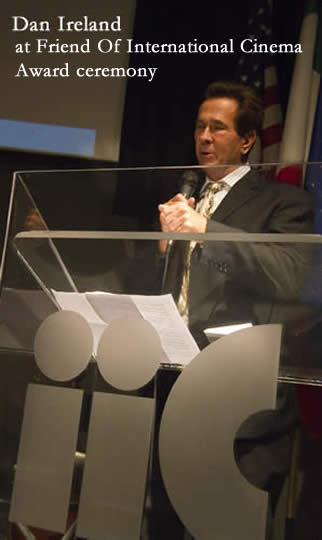 On May 10th 2012, Darryl Macdonald—Director of the Palm Springs International Film Festival, Palm Springs International Short Film Festival & Film Market, and Executive Director of the Palm Springs Film Society —received the first Cinema Without Borders’ Friend of International Cinema Award. This new prize goes to a person or an organization that helps promote international cinema in the U.S.
On May 10th 2012, Darryl Macdonald—Director of the Palm Springs International Film Festival, Palm Springs International Short Film Festival & Film Market, and Executive Director of the Palm Springs Film Society —received the first Cinema Without Borders’ Friend of International Cinema Award. This new prize goes to a person or an organization that helps promote international cinema in the U.S.
At the award ceremony, held in collaboration with the Italian Cultural Institute of Los Angeles, Dan Ireland—a filmmaker and a close friend of Darryl Macdonald for many years—introduced Darryl to the audience.
Cinema Without Borders recently had the pleasure of speaking with Dan Ireland (Read more about Dan at the end of the interview) about his memories of working and growing up with Darryl Macdonald.
Bijan Tehrani: How did you first meet Darryl Macdonald?
Dan Ireland: Darryl and I first met each other when we were in grade seven and we went to the same school, Kitsilano High School, in Vancouver, Canada. We were never in the same class, but we shared one teacher together that always talked about movies. One day she was talking to our class about a movie that one of her students (Darryl) had seen. After that, I went looking for him as I had seen the same movie, and felt the same as he did. When I started talking to him we both discovered we had a lot in common, so we became friends and went to see a lot of movies together. It was that, and the fact that we lived pretty close to each other, so I suppose if I have to look back I’d say that was the moment that our friendship really began.
BT: You mentioned that you both had an interest in foreign movies, which is very unusual.
DI: We both had the privilege of being brought up by the best foreign language theatre in the city, The Varsity Theatre, and the best rep house in the city at the time, The Hollywood Theatre, and both within the radiuss of where we lived. So unless we wanted to take a bus and go downtown, we went to these theatres. So, consequently, we both learned how to love foreign language films at a very early age. 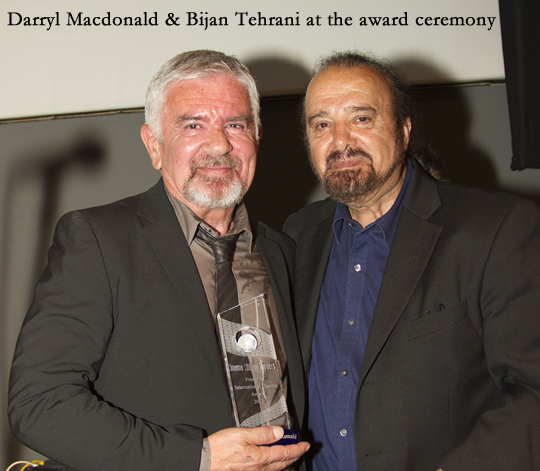
BT: You continued this friendship and you developed the idea to own a theatre for screening movies, how did that come about?
DI: We both worked for other people in our youth, me more than Darryl, he was going to University and loathing it. Finally, after working at a succession of theatre chains, I was booking a tiny independent theatre in Vancouver, the Rembrandt Cinema, and was looking for a theatre manager as I was still working at one of the theatre chains, too. I needed someone fulltime, and knew Darryl was the perfect candidate. I was also sick of hearing him bitch about University that I thought, okay, I’m going to lure him “in” one way or another. So instead of offering him a full-time position, I got smart, I offered him a part-time position, I knew he needed the money. Long story short, he jumped at it, and within two weeks he quit University and was doing full-time, running this little independent theatre that I was responsible for booking. Then eventually I got him into booking it, actually we were both booking it together, so we played a lot of classics, and introduced the notorious John Waters film, Pink Flamingos, which was banned in every other province in Canada. I think we were both 19 at the time, and we were always dreaming about having our own movie theatre, so on my vacation that year and I went down to 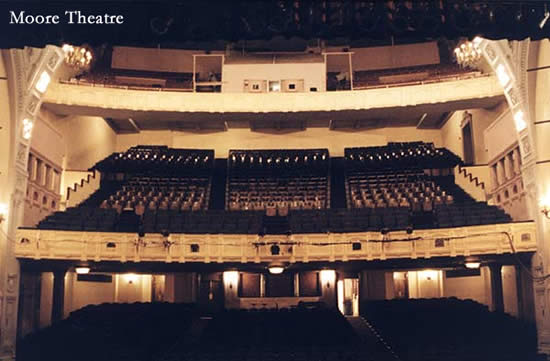 Seattle and saw this huge Gothic theatre called the Moore Theatre for rent. So on a whim I called the number on the marquee, and when the landlord came down and opened the doors to show me this theatre, suddenly a light bulb went off in my head, voila, and here it is! And talk about Cinema without Borders…I was born in Portland Oregon but my parents moved to Vancouver when I was five, so I have dual citizenship so it wasn’t a problem for me to move back. Darryl went to his parents and borrowed $5,000; I borrowed my 5K from a friend, Raymond Forsyth who believed in me. The rest is something out of a Mickey Rooney-Judy Garland movie where a group of kids decided to “put on a show”. We went around the city of Seattle and advertised for people to help us restore this theatre. We found a very willing, eccentric group of people that helped us, so instead of paying them, which we could not afford at the time, we fed them, and gave them a place to live — we all lived in the basement of the theatre. We had 36 dressing rooms, so we used them! The group of us completely restored the theatre on the $10,000 that we had, and we’re talking about a great big huge Mausoleum of a theatre. It was extraordinary the work that we did, we uncovered Moroccan Mosaic tile, we lit up painted over stained glass, we stripped paint everywhere, we gave the entire theatre a vibrant color scheme, and when we were finished, it looked like a million dollar job on the ridiculously low money we had in hand. All because these amazing people did it for free, giving us their time, their energy, their love and support. When we opened the theatre three months later, it was brutal as we didn’t have income coming into the theatre. To repay them, we gave them (paying) jobs and at least half of them became our permanent staff and stayed with us for years. Some of them are still working in the business, too. So, in a nuts
Seattle and saw this huge Gothic theatre called the Moore Theatre for rent. So on a whim I called the number on the marquee, and when the landlord came down and opened the doors to show me this theatre, suddenly a light bulb went off in my head, voila, and here it is! And talk about Cinema without Borders…I was born in Portland Oregon but my parents moved to Vancouver when I was five, so I have dual citizenship so it wasn’t a problem for me to move back. Darryl went to his parents and borrowed $5,000; I borrowed my 5K from a friend, Raymond Forsyth who believed in me. The rest is something out of a Mickey Rooney-Judy Garland movie where a group of kids decided to “put on a show”. We went around the city of Seattle and advertised for people to help us restore this theatre. We found a very willing, eccentric group of people that helped us, so instead of paying them, which we could not afford at the time, we fed them, and gave them a place to live — we all lived in the basement of the theatre. We had 36 dressing rooms, so we used them! The group of us completely restored the theatre on the $10,000 that we had, and we’re talking about a great big huge Mausoleum of a theatre. It was extraordinary the work that we did, we uncovered Moroccan Mosaic tile, we lit up painted over stained glass, we stripped paint everywhere, we gave the entire theatre a vibrant color scheme, and when we were finished, it looked like a million dollar job on the ridiculously low money we had in hand. All because these amazing people did it for free, giving us their time, their energy, their love and support. When we opened the theatre three months later, it was brutal as we didn’t have income coming into the theatre. To repay them, we gave them (paying) jobs and at least half of them became our permanent staff and stayed with us for years. Some of them are still working in the business, too. So, in a nuts
, that’s how we started. 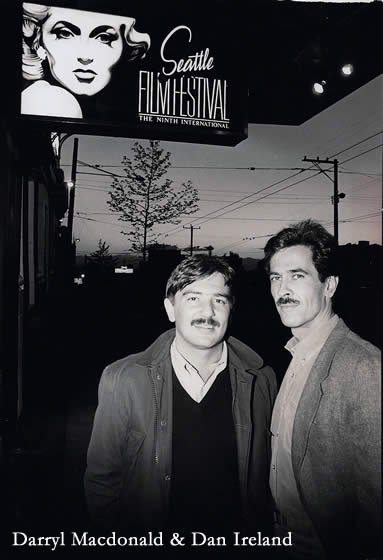
BT: How did you guys go from there to create the Seattle International Film Festival?
DI: I had worked for a theatre chain, Odeon Theatres, they owned The Varsity Theatre, the foreign language theatre that Darryl and I went to when we were kids. Every year they did a “Varsity Film Festival” and even though it wasn’t officially called the Vancouver Film Festival, it acted as such. I was lucky enough to have a small hand in it ever since I was seventeen years old. So, even before we opened the doors to our theatre, and because I already had experience in this world, I said to Darryl you know what, we should start the Seattle International Film Festival. He totally agreed, so, after we opened for business, and on the quiet, we put together the entire first year program. We didn’t tell anyone because there was a tremendous amount of competition in the city from other specialized theatres, so we had to be very secretive about it. We had our poster designed, the first year’s program booked, and so no one knew anything when we hit the streets with the posters and press. Everyone in the city, including our competition, was blown away when we started the first Seattle International Film Festival back in May, 1976. Our opening night film was Lina Wertmuller’s “All Screwed Up”, which is Italian, and I have to say that we were predisposed to love Italian cinema at a very early age. We would go to see things like “The Conformist”, “Death In Venice”, “Satyricon” when we were 17, 18 years old. I had no idea what we got from those movies at that age, but we certainly got something because today, they’re on my all-time favorite film list.
 BT: How did you end up splitting from the festival?
BT: How did you end up splitting from the festival?
DI: That was the toughest decision of my life, while I was running both the Egyptian Theatre and the Festival with Darryl, a gentleman by the name of Bill Quigley who worked with Walter Reade Theatres, which at the time was a big theatre chain, got hired by an independent company called Vestron Pictures. Vestron had primarily been a video company but they decided that they wanted to go into theatrical distribution. The person they hired for that transition, Bill Quigley, always watched with interest what we booked in our festival and theatre in Seattle. We had several successes that no other exhibitor or festival in the country had. We world premiered “Blood Simple”, the Coen Brother’s first film, at our festival, along with a slew of other films including “The Road Warrior”, “Alien”, “The Stunt Man”, and countless others, films people had never seen or heard of before. We were the first people to introduce Australian Cinema, the German new wave, and let’s not forget the Dutch films we became renown for. We eventually won awards for doing that, incidentally. We had so many unexpected successes with films that had flopped in other cities, festivals, theatres, so the attention was on what we were doing next. Whenever there was a problem picture, distributors would ask us to play it in the festival and after that, to run it in our year round theatre, The World Famous Egyptian. We became the most successful independent theatre in the state of Washington and by the way, it’s still going strong to this day. The Landmark chain run it now, and incidentally do a very fine job booking it. Our festival gave birth to the American distribution of films like Soldier of Orange by the brilliant Paul Verhoeven, the director of Robocop, Total Recall, Basic Instinct. But before Paul became the American success story he was destined to become, we launched all of his Dutch films and eventually sold them for distribution in America. So, when Bill Quigley went to Vestron Pictures he phoned me up and said “I need somebody to buy films for the company, and you’re my guy”. He made me an offer that was five times what I was making in Seattle. But what truly lured me into this phase of my career was that I was also allowed to buy unmade screenplays and stay on them throughout completion of the film(s), meaning that I was also getting to be an Executive Producer. It was such an amazing opportunity for me that I went to Darryl to discuss it; I needed his blessing and support. At first he didn’t feel that he could do it (the theatre and the festival) on his own, I reassured him he could and promised that if he if he ever needed anything I would be there in a heartbeat. He wasn’t happy at first, but he ultimately he said, do it. Regardless, it was difficult for both of us, because as I said we were inseparable. Cut to a few years later, it turned out to be as I expected great for both of us. Every single year I watched our festival grow under Darryl’s leadership, and generously, he allowed me a small hand in it. Whenever I saw a great film, I’d call him and give him a tip or three, and he always followed through. He allowed me to stayed connected to the festival because if I have to go back to anything in my life and go where is the essence of who you are as a person as an artist, I’d go right to my friend Darryl; he’s the guy that I discovered all of this with and he’s the one who gave me the confidence to be brave, and the guy who gave me the generous blessing of say yes, follow your career. When I spoke at your event the other evening it was ironic, it was my birthday, Darryl didn’t remember (he never does) but what he also doesn’t realize is that he’s already given me the greatest gift of my life, his friendship. I spoke from my heart, because that’s who Darryl is to me, he’s my brother, my best friend, the person who still pushes my buttons more than anyone I know, and the person who still makes me feel like a million bucks when I need it most. That’s the price you pay and the blessing for anyone in your life who counts so much. Lucky me.
BT: What do you think about Palm Spring and where it has gotten with Darryl Macdonald?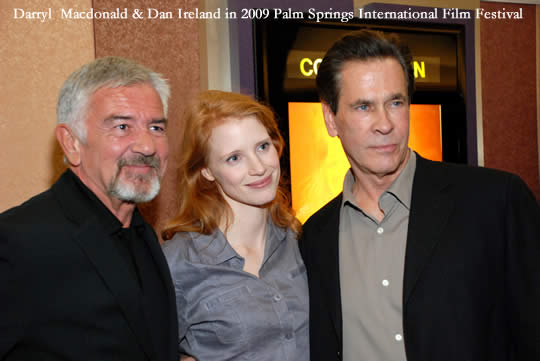
DI: Palm Springs would still be the B festival that it was without Darryl. Now it’s an A+ festival from what Darryl has put into it. Now, there’s so much life, so much vibrancy, so much importance, so much intelligence in the programming, so much zest for the filmmakers who go there. If you have a film in Palm Springs, Darryl makes you feel like you’re the only film in the festival, and I am telling you from experience, it’s not only a feat, he means it from the bottom of his heart, he is always 100% sincere.
BT: What is the latest film that you are involved with right now?
DI: At this moment in time I’m doing a film called “Mr. Lively” and Raffaella De Laurentiis is producing it. It’s a comedy inspired by a couple of different things. A few years back I made a film, “Mrs. Palfrey at the Claremont” and it won the audience award in Palm Spring. When I was down there I was so completely blown away by the reception from the audience, that I thought I want to make a movie here (Palm Springs). So, one day so I wrote (with my writing partner, Bradley Jackson) a movie that served its due place in Palm Springs…it’s an unusual comedy and so far we’re getting great response from actors, so that’s a great thing. So, that’s foremost in my immediate future, hopefully.
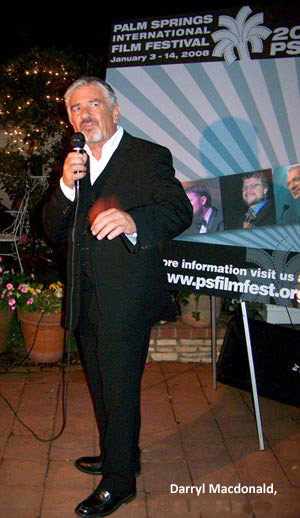 BT: Do you attend the festivals?
BT: Do you attend the festivals?
DI: Are you kidding me, every chance I get. Seattle, Palm Springs, and LAFF mostly. I wouldn’t miss them for the world, in fact the only thing that would keep me away from any of those festivals is if I had a film in production. Film is something that I need to feed my mind, my heart, my soul, it’s part of who I am. Every year BT I go to Seattle to because I’m one of the two daddy’s that started it and regardless of my involvement, I still feel like it’s my kid. You never desert your kid, even if you don’t live in the same city. I just returned from this year’s event and as always I’m astounded at how it’s grown, changed, evolved. Both Darryl and I had the opportunity to start something, and mold it’s origins to the best of our abilities, then move on to other challenges. I was there for twelve years of my life, Darryl stayed on for a decade or two longer before Palm Springs beckoned. And what Darryl took with him from the experience of running Seattle, both with and without me, is grounding the Palm Springs Film Festival, to give it its place on the festival map, to take it to where it deserved and needed to be. Darryl has expanded the Palm Springs Film Festival in ways both artistically and commercially that no one else could ever do quite the same. Filmmakers now want their films in the festival, agents now want their talent at the International Gala every year that kicks the festival off, and mostly, finally, the Palm Springs community has something to boast about…films that educate, entertain, provoke and linger in your mind long after you leave the theatre. And they show their support by record breaking attendance every year. It’s at a much more international level than where it ever was, and both Harold Metzger (the Executive Director) and the city of Palm Springs can finally be proud of what they have in both Darryl and the festival. What Darryl Macdonald has done in Palm Springs is mind blowing, am I surprised? Hell, no, I knew that back in grade seven.
About Dan Ireland 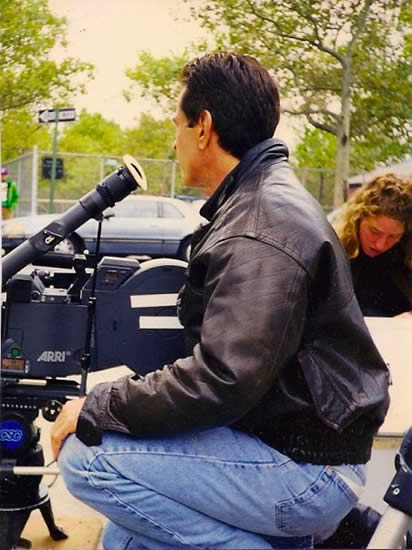
Dan Ireland began his career as the co-founder/co-director of The Seattle International Film Festival In the 1980’s, Ireland was the co-owner /cooperator of The Egyptian Theatre, the most successful independent theatre in the state of Washington. Ireland remained at the theatre and festival until 1986, where he was Executive Vice President of Acquisitions for Vestron Pictures. It was at Vestron that Ireland developed his filmmaking skills. During his time there, he was Executive Producer of fifteen films including John Huston’s final film ‘The Dead’ (two Oscar nominations), Bernard Rose’s feature debut ‘Paperhouse’ and Ken Russell’s ‘The Rainbow’.
In 1996 Ireland made his debut as a feature director for Cineville with the highly acclaimed film, THE WHOLE WIDE WORLD, starring Vincent D’Onofrio and Renee Zellweger also produced by Ireland and D’Onofrio.
It was this performance that introduced Zellweger to producer James L. Brooks and director Cameron Crowe for her follow up film, ‘Jerry Maguire’, and launched her into international stardom. ‘The Whole Wide World’ was on over 50 top ten critics year end lists and won Zellweger the coveted National Society of Film Critics award for most promising newcomer of the year. D’Onofrio was named runner up as Best Actor by the same organization for his performance. Ireland re-teamed with D’Onofrio for 1998’s controversial ‘The Velocity of Gary’, the film also starred Salma Hayak and introduced Thomas Jane (The Punisher).
In 2003, Ireland directed the romantic comedy, ‘PASSIONADA’, released to critical acclaim by The Samuel Goldwyn Company and internationally by Columbia-TriStar Pictures. It was her performance in this film that brought Emmy Rossum to the attention of director Joel Schumacher for the lead role in Andrew Lloyd Weber’s ‘The Phantom of the Opera’.
Ireland’s next film, MRS. PALFREY AT THE CLAREMONT, based on the celebrated novel by the late English novelist, Elizabeth Taylor, stars the legendary Dame Joan Plowright (Lady Olivier, and star of Enchanted April) in her largest screen role to date.
Mrs. Palfrey is the humorous, bittersweet story of a recently widowed elderly woman who moves to London, and her unexpected friendship with a young writer who is at the turning point in his life.
Since that time, Dan Ireland embarked on the journey of bringing E.L. Doctorow’s provocative short story JOLENE to the screen. Jolene is the story of a young woman’s odyssey through America, ages fifteen through twenty-five, her survival, and her ultimate quest to find love.
The lead actress, Jessica Chastain, whom Ireland introduces to the screen with this role, won the coveted Best Actress Award at The Seattle International Film Festival for her performance, and it was this film that helped her land the lead roles opposite Brad Pitt and Sean Penn in Terrence Malick’s upcoming film, THE TREE OF LIFE.
Starring opposite Jessica Chastain in JOLENE are Rupert Friend (Mrs Palfrey at The Claremont), Dermot Mulroney, Michael Vartan, Chazz Palminteri, Denise Richards and Frances Fisher. The film was released in November, 2010. The DVD is set for release April 2011.
Last year, Dan Ireland re-teamed with Renee Zellweger in her first outing as a producer to make LIVING PROOF, the story of Dr Dennis Slamon, the creator of Herceptin, the only drug effective in the combat against breast cancer. Neil Meron and Craig Zadan also executive produced. The film aired on Lifetime as part of their Breast Cancer Awareness Month to great acclaim and drew over 16 million viewers.
Awards:
Nederlands Film Festival 1982 – Won, Golden Calf for Furthering the Dutch Film Industry in America
Newport Beach Film Festival 2006 – Won, Audience Award Best Film for Mrs Palfrey at The Claremont
Palm Springs International Film Festival 2006 – Won, Audience Award for Mrs Palfrey at The Claremont
Seattle International Film Festival 1996 – Won, Audience Award, 1996, Best Film for The Whole Wide World
Sundance Film Festival 1996 – Nominated, Grand Jury Prize Dramatic for The Whole Wide World (1996)

